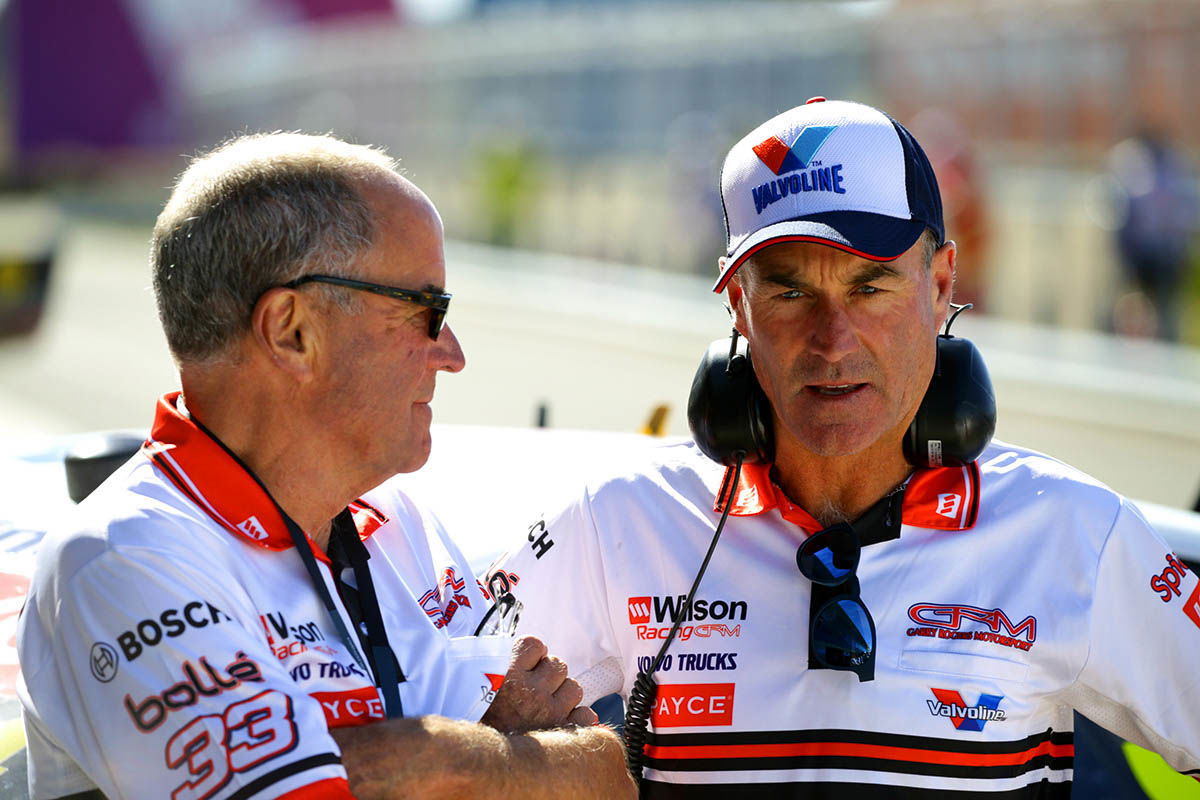

Barry Rogers says Supercars can improve its entertainment product whilst simultaneously cutting costs in the wake of the coronavirus pandemic.
Until last year, Garry Rogers Motorsport had been a staple of the Virgin Australia Supercars Championship through its various guises since 1996.
Last week Rogers said his team might consider a return to the Supercars scene “if it made sense”.
However, the category currently remains cost-prohibitive for the team due to the volume of personnel required to compete.
The team currently contests the carsales TCR Australia Series and VHT S5000 Australian Drivers’ Championship.
Taking into consideration an equivalent number of rounds, Rogers said a single TCR car costs roughly a quarter of what it costs to run a Supercar.
He estimates 20 people would be required to run a two-car Supercars team while a two-car TCR operation only requires seven or eight people.
Rogers believes personnel numbers required to run a Supercars team could be reined in while having no adverse effect on the racing.
“I think you’d still have a good show,” Rogers told Speedcafe.com.
“Pit stops are the first thing that comes up. You still can have pit stops with a crew of seven.
“You might introduce that you can’t fuel while you do tyres or vice versa, so you can double up on some people.
“Or you might bring in rules you can only do two tyres at each stop or something like that, so you’ve only got two wheel changes instead of four.
“There’s a whole lot of things you can do to keep the show going with less staff.”
Supercars is set to introduce its long-awaited Gen3 regulation package in 2022, which is hoped will curb costs.
It’s a sentiment echoed by Rogers who believes there are quick fixes that can be made.
“The big cost is all the data gathering of the Supercar,” said Rogers.
“They’ve got that many sensors and bits and pieces hanging off them, it’s data everywhere.
“I liken it to the AFL. I can’t stand watching football when they flash to the coaches’ boxes and you’ve got all these people looking at computer screens. That’s just as bad.
“They’re watching who’s run this far and that far. Just watch the game.
“Put fuel in the car, put the driver in the car, go out and race. You don’t need, ‘Oh, hold on, you can break five metres later here and two metres over here.’
“We can see that it’s all crap. Gone are the days where the driver uses his own skill and daring to get to the front.
“You’ve got to have 10 engineers graphing things and pointing things and add a sensor here and take a sensor there.
“There is no doubt there is a spot for engineering in motorsport, but that’s at Formula 1. Leave it there.
“All motor racing needs to be about is entertainment, right? If you have entertainment and it’s affordable, it’ll be successful.
“Not only that, at the end of the season, the right bloke will win the championship.
“I’m not saying the right bloke hasn’t won it, because there’s no doubt that over the last 15 years here between (Shane) van Gisbergen and (Jamie) Whincup and (Scott) McLaughlin, they are the best drivers.
“But if they’d have been just in basic cars without all this stuff, those same blokes would’ve won anyway because they are the best.”
Rogers said the current state of play in Supercars is “disheartening” due to the disparity in competitiveness between teams.
“They know that they just can’t catch teams in front,” he said.
“It’s not due to their driver, it’s due to maybe equipment and what they’re prepared to invest compared to others.
“I don’t think in a country like ours that we need to have motorsport like that.”
Ultimately, he hopes the next generation of regulations will see drastic cost-cutting and levelling of the playing field that he believes would make for “a lot better racing”.
Rogers said the need to cut costs is particularly important in the wake of the coronavirus pandemic, which has already seen one Supercars team – 23Red Racing – depart the sport.
“Money will not be easy to get,” he said.
“I think it’s really, really important to be thrifty but also be smart in the way you go about it.
“If you can have a lot simpler race car that is entertaining, I think you’d actually gain fans and not lose fans.
“The cars aren’t cheap cars. They’re not cheap cars. We’ve travelled in recent years and we didn’t stop spending, maybe we spent in the wrong areas,
“There’s that constant thing where you’d rather just be given a car and say, ‘There’s your car. You can’t change anything, go and race,’ I think that’s what the fans want to see.
“They want to see the best bloke winning the race, they don’t necessarily want to see the smartest engineer that could design the smartest part that made that car better than another car.
“They like to see competition and fair competition. The major obstacle for us was the cost of doing it.”




















Discussion about this post